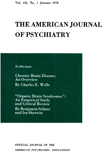The bent twig: psychiatry and medical education
Abstract
The authors note that an increase in psychiatry's involvement in the selection and education of medical school students, which historically has been limited and problematic, would benefit both the discipline and the profession in general. There is evidence indicating the need to pay attention to personal attributes in medical education, particularly in light of the incidence of problems in physicians (e.g., addiction, alcoholism, and suicide) that fall within psychiatry's area of expertise. Active participation by psychiatry in medical education might also help combat the cynicism that seems to develop during training and might contribute to consideration of ethical issues and to the fostering of emotional maturity.
Access content
To read the fulltext, please use one of the options below to sign in or purchase access.- Personal login
- Institutional Login
- Sign in via OpenAthens
- Register for access
-
Please login/register if you wish to pair your device and check access availability.
Not a subscriber?
PsychiatryOnline subscription options offer access to the DSM-5 library, books, journals, CME, and patient resources. This all-in-one virtual library provides psychiatrists and mental health professionals with key resources for diagnosis, treatment, research, and professional development.
Need more help? PsychiatryOnline Customer Service may be reached by emailing [email protected] or by calling 800-368-5777 (in the U.S.) or 703-907-7322 (outside the U.S.).



